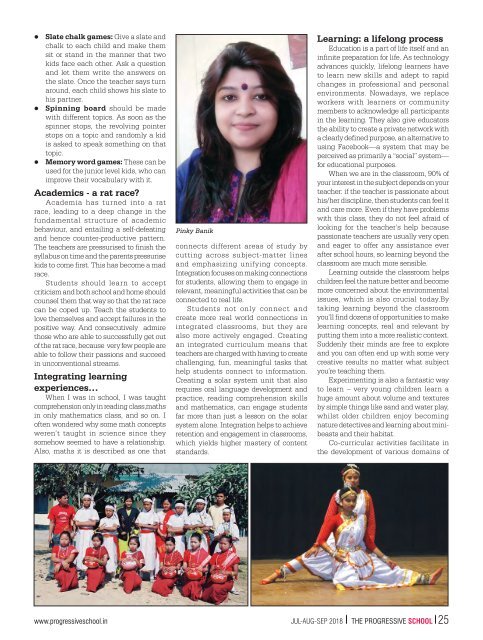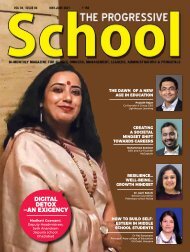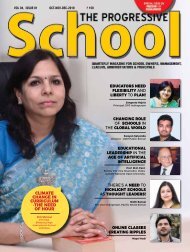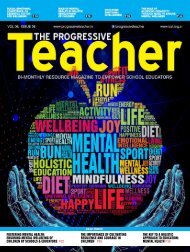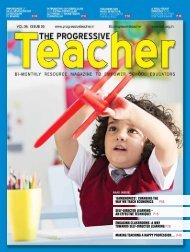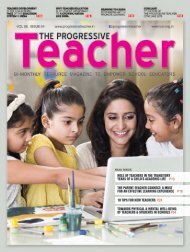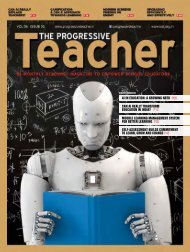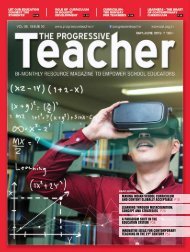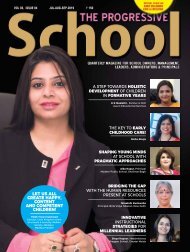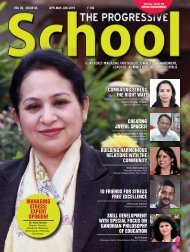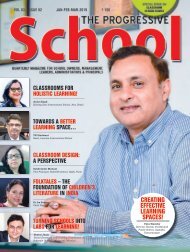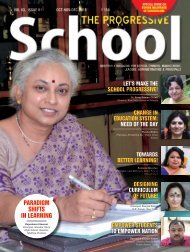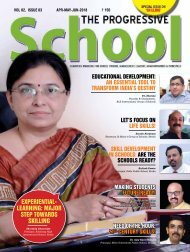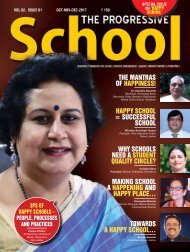The Progressive School Vol 02 Issue 04
The Progressive School is a quarterly magazine for school owners, leaders and principals. It will continue to address vital issues that impact the emerging challenges in the design, administration and growth of schools in all its dimension.
The Progressive School is a quarterly magazine for school owners, leaders and principals. It will continue to address vital issues that impact the emerging challenges in the design, administration and growth of schools in all its dimension.
Create successful ePaper yourself
Turn your PDF publications into a flip-book with our unique Google optimized e-Paper software.
• Slate chalk games: Give a slate and<br />
chalk to each child and make them<br />
sit or stand in the manner that two<br />
kids face each other. Ask a question<br />
and let them write the answers on<br />
the slate. Once the teacher says turn<br />
around, each child shows his slate to<br />
his partner.<br />
• Spinning board should be made<br />
with different topics. As soon as the<br />
spinner stops, the revolving pointer<br />
stops on a topic and randomly a kid<br />
is asked to speak something on that<br />
topic.<br />
• Memory word games: <strong>The</strong>se can be<br />
used for the junior level kids, who can<br />
improve their vocabulary with it.<br />
Academics - a rat race?<br />
Academia has turned into a rat<br />
race, leading to a deep change in the<br />
fundamental structure of academic<br />
behaviour, and entailing a self-defeating<br />
and hence counter-productive pattern.<br />
<strong>The</strong> teachers are pressurised to finish the<br />
syllabus on time and the parents pressurise<br />
kids to come first. This has become a mad<br />
race.<br />
Students should learn to accept<br />
criticism and both school and home should<br />
counsel them that way so that the rat race<br />
can be coped up. Teach the students to<br />
love themselves and accept failures in the<br />
positive way. And consecutively admire<br />
those who are able to successfully get out<br />
of the rat race, because very few people are<br />
able to follow their passions and succeed<br />
in unconventional streams.<br />
Integrating learning<br />
experiences…<br />
When I was in school, I was taught<br />
comprehension only in reading class,maths<br />
in only mathematics class, and so on. I<br />
often wondered why some math concepts<br />
weren’t taught in science since they<br />
somehow seemed to have a relationship.<br />
Also, maths it is described as one that<br />
Pinky Banik<br />
connects different areas of study by<br />
cutting across subject-matter lines<br />
and emphasizing unifying concepts.<br />
Integration focuses on making connections<br />
for students, allowing them to engage in<br />
relevant, meaningful activities that can be<br />
connected to real life.<br />
Students not only connect and<br />
create more real world connections in<br />
integrated classrooms, but they are<br />
also more actively engaged. Creating<br />
an integrated curriculum means that<br />
teachers are charged with having to create<br />
challenging, fun, meaningful tasks that<br />
help students connect to information.<br />
Creating a solar system unit that also<br />
requires oral language development and<br />
practice, reading comprehension skills<br />
and mathematics, can engage students<br />
far more than just a lesson on the solar<br />
system alone. Integration helps to achieve<br />
retention and engagement in classrooms,<br />
which yields higher mastery of content<br />
standards.<br />
Learning: a lifelong process<br />
Education is a part of life itself and an<br />
infinite preparation for life. As technology<br />
advances quickly, lifelong learners have<br />
to learn new skills and adept to rapid<br />
changes in professional and personal<br />
environments. Nowadays, we replace<br />
workers with learners or community<br />
members to acknowledge all participants<br />
in the learning. <strong>The</strong>y also give educators<br />
the ability to create a private network with<br />
a clearly defined purpose, an alternative to<br />
using Facebook—a system that may be<br />
perceived as primarily a “social” system—<br />
for educational purposes.<br />
When we are in the classroom, 90% of<br />
your interest in the subject depends on your<br />
teacher: if the teacher is passionate about<br />
his/her discipline, then students can feel it<br />
and care more. Even if they have problems<br />
with this class, they do not feel afraid of<br />
looking for the teacher’s help because<br />
passionate teachers are usually very open<br />
and eager to offer any assistance ever<br />
after school hours, so learning beyond the<br />
classroom are much more sensible.<br />
Learning outside the classroom helps<br />
children feel the nature better and become<br />
more concerned about the environmental<br />
issues, which is also crucial today.By<br />
taking learning beyond the classroom<br />
you’ll find dozens of opportunities to make<br />
learning concepts, real and relevant by<br />
putting them into a more realistic context.<br />
Suddenly their minds are free to explore<br />
and you can often end up with some very<br />
creative results no matter what subject<br />
you’re teaching them.<br />
Experimenting is also a fantastic way<br />
to learn – very young children learn a<br />
huge amount about volume and textures<br />
by simple things like sand and water play,<br />
whilst older children enjoy becoming<br />
nature detectives and learning about minibeasts<br />
and their habitat.<br />
Co-curricular activities facilitate in<br />
the development of various domains of<br />
www.progressiveschool.in<br />
JUL-AUG-SEP 2018<br />
THE PROGRESSIVE SCHOOL<br />
25


